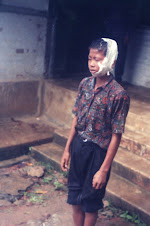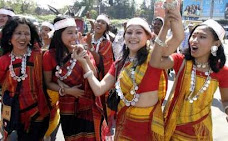
The Chittagong Hill Tracts (CHT) Commission, first formed in 1991, was disbanded after
Lord Eric Avebury
the signing of the CHT Peace Accord in the hope that the treaty would be implemented. According to Lord Eric Avebury, Vice-Chair of the Parliamentary Human Rights Group, UK, however, only partial implementation occurred and primary difficulties, such as with regard to land, disputes over the possession of land and the presence of the army in the CHT continued. This led to a decision at an international conference in Copenhagen in May of this year, to re-constitute the commission. From August 6-15, the group, co-chaired by Lord Avebury and Sultana Kamal, advocate and human rights activist, visited Bangladesh and the CHT and met with different stakeholders in order to make a preliminary assessment of the situation in the Hill Tracts.
Lord Avebury talked to The Star about the committee's initial impressions about the situation.
Kajalie Shehreen Islam
The Star (TS): What was your general impression of the overall situation in the CHT?
Lord Eric Avebury
the signing of the CHT Peace Accord in the hope that the treaty would be implemented. According to Lord Eric Avebury, Vice-Chair of the Parliamentary Human Rights Group, UK, however, only partial implementation occurred and primary difficulties, such as with regard to land, disputes over the possession of land and the presence of the army in the CHT continued. This led to a decision at an international conference in Copenhagen in May of this year, to re-constitute the commission. From August 6-15, the group, co-chaired by Lord Avebury and Sultana Kamal, advocate and human rights activist, visited Bangladesh and the CHT and met with different stakeholders in order to make a preliminary assessment of the situation in the Hill Tracts.
Lord Avebury talked to The Star about the committee's initial impressions about the situation.
Kajalie Shehreen Islam
The Star (TS): What was your general impression of the overall situation in the CHT?
Lord Avebury (LA): It is generally recognised that the accord has not been fully implemented and it needs to be pursued. There are problems, particularly with regard to land, disputes over the possession of land and the presence of the army in the CHT. The Land Commission, for example, is dormant, it does not do anything and one of the principal problems in the CHT is disputed ownership of land and sometimes multiple claims to an existing piece of land and there's no manner of resolving this argument. Ostensibly, now new leases of land are not being granted in the CHT but we were told that in fact that rule is not strictly applied and there have been grants of land particularly to senior officials in the previous government and to development companies which are actively involved in horticulture and rubber plantations, for example, and the allocation of the land to these corporations and in one case to an international non-governmental organisation (NGO) are at the expense of the indigenous peoples. Although people say that the CHT is grossly under-populated compared to the rest of Bangladesh (it is constantly being said that 2% of the population occupy 10% of the land), it's not all cultivable and the percentage of the land to be used for agriculture is much more limited than in the plains. You can't just look at the population, you have to consider the amount of arable land.
TS: You met with military personnel in the Hill Tracts as well as with the Chief of Army Staff in Dhaka. What did they have to say about the army presence in the CHT?
TS: You met with military personnel in the Hill Tracts as well as with the Chief of Army Staff in Dhaka. What did they have to say about the army presence in the CHT?
LA: We asked them why the large scale of presence of the army was necessary considering that crime is at a very low level in the CHT compared to the rest of Bangladesh and though there have been incidents of terrorism such as the abduction of aid workers this is not a common phenomenon. We put it to the army, what are the recent events that led you to believe that it is necessary to have this large-scale presence and can you tell us one such event. We were told about the discovery of a cache of arms in the forest on May 11 -- .303 rifles (antiquated weapons which were used when I was in the army 60 years ago) and .22 rifles which I think are sporting rifles used in competitions in the Olympic games and that sort of thing, so it didn't seem that was a good reason to explain the army presence. When we said that this was not particularly significant, we were told that there was large-scale infiltration across the borders from both Burma and India and smuggling of drugs across these countries which need to be prevented. When we suggested that the Bangladesh Rifles (BDR) were supposed to be at the frontier the army commander told us that they didn't have sufficient resources to cope with these problems, that the scale of the smuggling of drugs and weapons across the frontiers is so significant that there needs to be army back-up.
TS: Despite the army presence, there are numerous cases of violence against the indigenous people in the hill tracts, including rape and murder. What is the army doing about such crimes?
TS: Despite the army presence, there are numerous cases of violence against the indigenous people in the hill tracts, including rape and murder. What is the army doing about such crimes?
LA: There is a difference of opinion between the indigenous people and the Bangali communities in the CHT. The Bangali communities on the whole supported the presence of the army saying they were there to protect them, while the indigenous people were entirely against it and felt intimidated by the army presence. If you ask the army, they will say they are protecting the whole population. It is constantly emphasised by members of the army that they have peacekeeping experience in foreign countries where they had to look after the interests of minority communities such as in Sarajevo and they claimed that those experiences gave them particular sympathy for the minorities which was applicable in the CHT. But the difference in the opinion of the two communities in the CHT is a source of tension between the communities which is inevitable as long as the army is present.
TS: What is the position of the political parties on the development of the indigenous communities and implementation of the Peace Accord?
LA: I must say there is a certain amount of agreement between the political parties that affirmative action in terms of raising the level of education, health and so on among the indigenous people should be the priority of every government.
With regard to the implementation of the treaty, however, the political parties have a difference of views. The Awami League (AL) believes the treaty should be implemented in full and say that if they come to power that's what they'll do. The Jamaat, on the other hand, told us that they are in favour of affirmative action to bring the level of the indigenous people to the level of the Bangali community. The parties, including Jamaat, are all strong believers in freedom of religion.
But as far as land is concerned they say that Bangladesh is a unitary state and just as an indigenous person can come and buy land in Dhaka, a person from Dhaka can go to the CHT and buy land. They don't recognise the distinction in the treaty between the right to buy or occupy land in the CHT and the rest of Bangladesh. There are international dimensions to this. The United Nations (UN) General Assembly passed a resolution last September on the rights of indigenous people that was ratified by a large majority of countries which represents the will of the international community. And that does recognise this distinction with regard to the occupation of land. There are quite a few countries where special land rights of the indigenous people are recognised such as of the people of the Amazon in Brazil, the aborigines in Australia, the Maori community in New Zealand, where they are given special occupation rights to large stretches of land which they historically enjoyed. There need to be territories in which indigenous people do have special occupation of land rights and that's in the '97 accord.
TS: How do you think the internal conflict between the pro-treaty Jatiyo Sanghati Samity (JSS) and anti-treaty United People's Democratic Forum (UPDF) may be resolved?
LA: The JSS and UPDF have to sit and talk, they are not committed to talking, which is one of the main problems that we face; you don't get anywhere by not talking
As for the demands, it is a matter of the people of Bangladesh. If the demands are made on top of what is provided in the treaty and seem to be excessive to the political parties and the electorate then when the matter gets put to the vote in December, they will not be accepted. The treaty, however, is not set in stone and there may be matters which have arisen since the treaty which people would agree can be added to it. For example, with regard to the Land Commission, there need to be ground rules and rules of procedure which determine the way you solve disputes; most people would agree that that would be a sensible addition to the treaty.
TS: What is the next step for the CHT Commission and what are your hopes about the overall situation in the Hill Tracts?
LA: Many problems remain to be solved but they are not insoluble. This was a preparatory visit. There will be another visit. We will not be able to make any report based on this preliminary assessment, it would be premature. We do not want to draw conclusions based on insufficient evidence. We will have to decide how we will gather further information on the situation in the CHT, which will be analysed and made into a series of recommendations which will be put to the government. The process may take months, over which period of time we will observe the trends in the CHT and whether the existing problems continue.
In every society there are differences of opinion that need to be resolved by political means. With regard to the CHT, the surprising degree of unanimity on the implementation of the accord is a very hopeful sign. The differences of opinion with regard to land, etc., can be resolved not to the satisfaction of every individual but at least in terms of the majority and it'll be interesting to see in the forthcoming elections whether this is a matter of discussion. More than the caretaker government, change in the CHT will depend on the political government which comes to power. We should not ignore the unity of the commitment on the full implementation of the accord.
Copyright (R) thedailystar.net 2008












